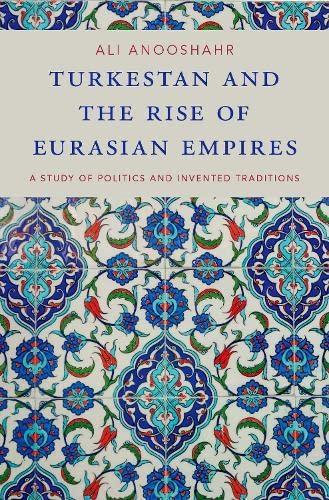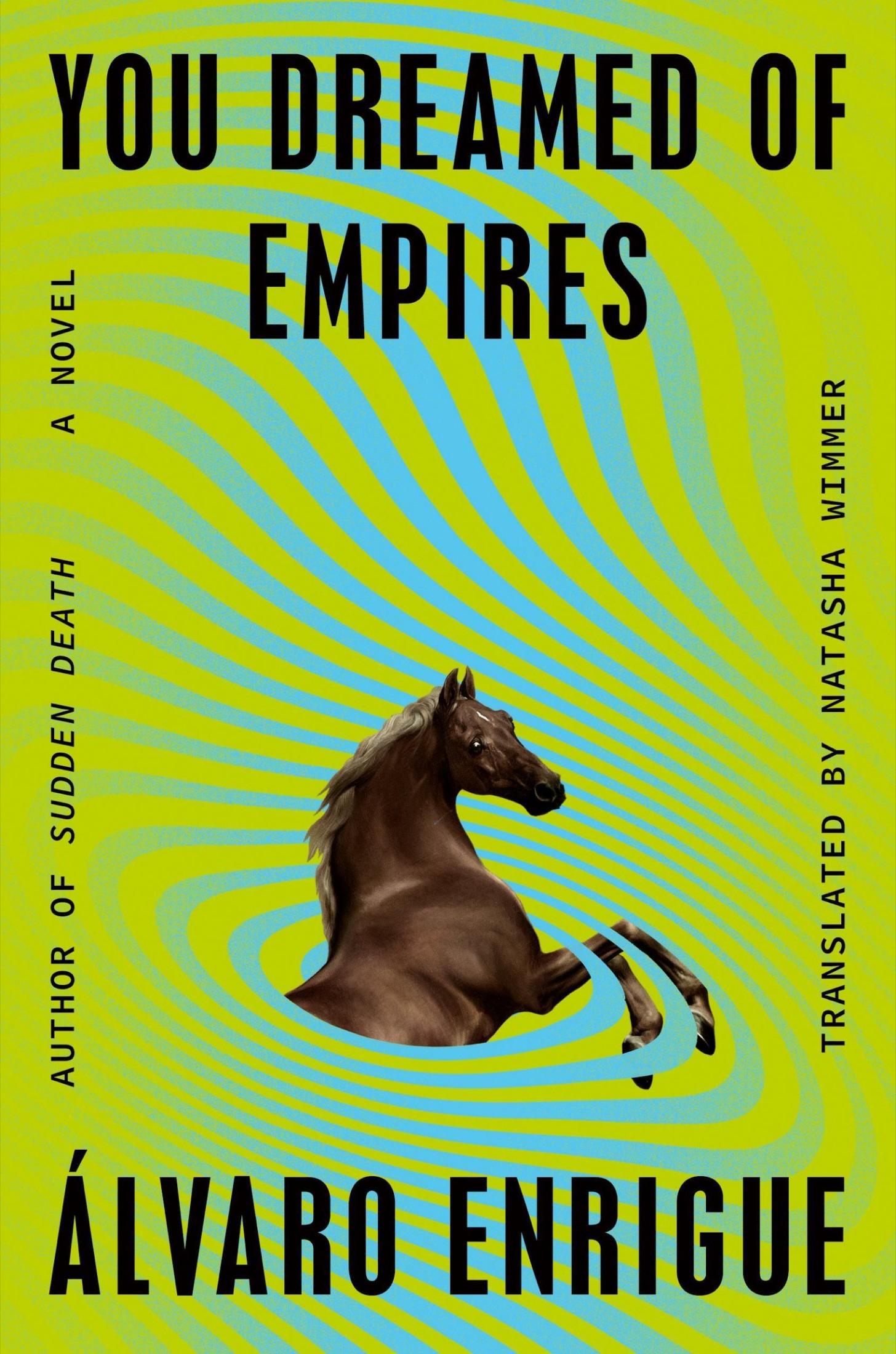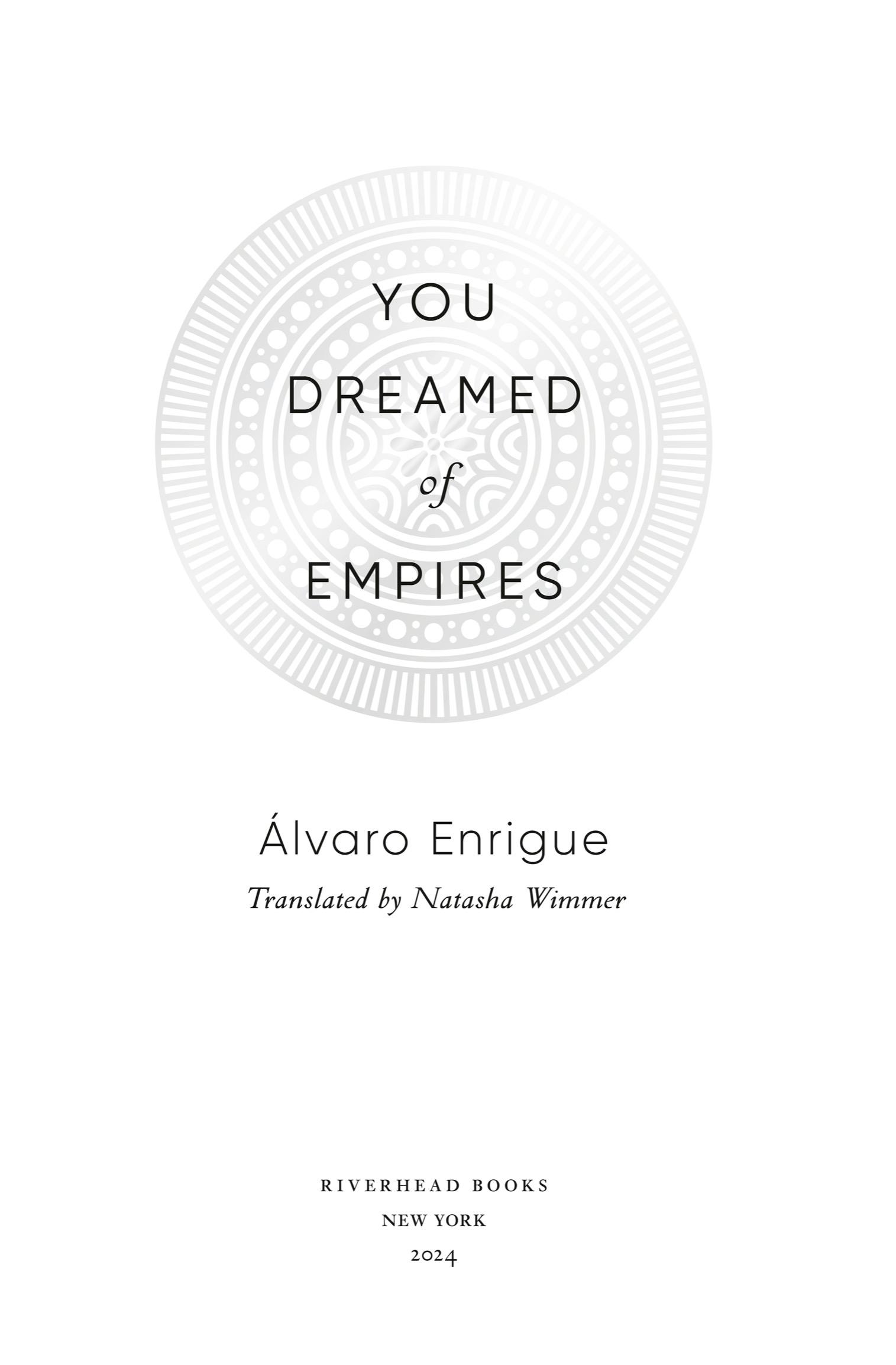You Dreamed of Empires: A Novel Álvaro Enrigue
Visit to download the full and correct content document: https://ebookmass.com/product/you-dreamed-of-empires-a-novel-alvaro-enrigue/
More products digital (pdf, epub, mobi) instant download maybe you interests ...
Since You: A Novel Sarah Hill
https://ebookmass.com/product/since-you-a-novel-sarah-hill/
Lonely for You Only: A Lancaster Novel Monica Murphy
https://ebookmass.com/product/lonely-for-you-only-a-lancasternovel-monica-murphy/
I Have Some Questions for You: A Novel Rebecca Makkai
https://ebookmass.com/product/i-have-some-questions-for-you-anovel-rebecca-makkai/
See You Again (Dangerous Blooms Book 3): A Romantic Suspense Novel Kate Breitfeller
https://ebookmass.com/product/see-you-again-dangerous-bloomsbook-3-a-romantic-suspense-novel-kate-breitfeller/
Because You Said Yes: A Small Town Marriage of Convenience Romance (A Willow Bay Novel Book 3) Kelly Collins
https://ebookmass.com/product/because-you-said-yes-a-small-townmarriage-of-convenience-romance-a-willow-bay-novel-book-3-kellycollins/
The Secret Book of Flora Lea: a Novel: A Novel Patti Callahan Henry
https://ebookmass.com/product/the-secret-book-of-flora-lea-anovel-a-novel-patti-callahan-henry/
The End of Empires and a World Remade: A Global History of Decolonization. 1st Edition Martin Thomas.
https://ebookmass.com/product/the-end-of-empires-and-a-worldremade-a-global-history-of-decolonization-1st-edition-martinthomas/
Kingdoms, Empires, and Domains: The History of HighLevel Biological Classification Mark A. Ragan
https://ebookmass.com/product/kingdoms-empires-and-domains-thehistory-of-high-level-biological-classification-mark-a-ragan/
Turkestan and the Rise of Eurasian Empires: A Study of Politics and Invented Traditions Ali Anooshahr
https://ebookmass.com/product/turkestan-and-the-rise-of-eurasianempires-a-study-of-politics-and-invented-traditions-alianooshahr/
ALSO BY ÁLVARO ENRIGUE
translated by Natasha Wimmer
SuddenDeath
RIVERHEAD BOOKS
An imprint of Penguin Random House LLC penguinrandomhouse.com
English translation copyright © 2024 by Natasha Wimmer
Copyright © 2022 by Álvaro Enrigue
Simultaneously published in Great Britain by Harvill Secker, an imprint of Penguin Random House Ltd., London, in 2024
First published in Spain as Tusueñoimperioshansidoby Editorial Anagrama, Barcelona, in 2022
Penguin Random House supports copyright. Copyright fuels creativity, encourages diverse voices, promotes free speech, and creates a vibrant culture. Thank you for buying an authorized edition of this book and for complying with copyright laws by not reproducing, scanning, or distributing any part of it in any form without permission. You are supporting writers and allowing Penguin Random House to continue to publish books for every reader
Riverhead and the R colophon are registered trademarks of Penguin Random House LLC.
The English translation of the epigraph is based on Ángel María Garibay’s Spanish rendering of the original Nahuatl.
Library of Congress Cataloging-in-Publication Data
Names: Enrigue, Alvaro, 1969– author. | Wimmer, Natasha, translator.
Title: You dreamed of empires / Álvaro Enrigue ; translated by Natasha Wimmer. Other titles: Tu sueño imperios han sido. English
Description: New York : Riverhead Books, 2024. | Includes bibliographical references. Identifiers: LCCN 2023022064 (print) | LCCN 2023022065 (ebook) | ISBN 9780593544792 (hardcover) | ISBN 9780593544815 (ebook)
Subjects: LCSH: Tenochtitlán, Battle of, Mexico City, Mexico, 1521—Fiction. | Mexico—History—Conquest, 1519–1540—Fiction. | LCGFT: Alternative histories (Fiction) | Historical fiction. | Novels.
Classification: LCC PQ7298.15.N636 T813 2024 (print) | LCC PQ7298.15.N636 (ebook) | DDC 863/.64— dc23/eng/20230512
LC record available at https://lccn.loc.gov/2023022064
LC ebook record available at https://lccn.loc.gov/2023022065
Cover design: Grace Han
Cover image: (horse) Detail from Whistlejacketby George Stubbs, 1762 / Photo: Bridgeman Images
BookdesignbyAmandaDewey,adaptedforebookbyCoraWigen
This is a work of fiction. Names, characters, places, and incidents either are the product of the author’s imagination or are used fictitiously, and any resemblance to actual persons, living or dead, businesses, companies, events, or locales is entirely coincidental.
pid_prh_6.2_145852931_c0_r0
CONTENTS
Cover
AlsobyÁlvaroEnrigue,TranslatedbyNatashaWimmer
TitlePage
Copyright
Dedication
Epigraph
ANotetoEnglish-LanguageReaders
TheCaxtilteca
TheTenochca
I. Before the Nap
II. Moctezuma’s Nap
III. After the Nap
IV. Cortés’s Dream
Acknowledgments
AbouttheAuthorandTranslator
ForAimé,ofcourse. AndforMiquelandDylanandMaiaandEmilioG.
Again they asked, “What will the gods eat? Everyone is looking for food.” Then the ant went to collect kernels of corn from the Mountain of Sustenance. Quetzalcoatl met the ant and said to him: “Tell me where you got that.” Many times he asked, but the ant wouldn’t tell. Then the ant said: “Over there.”
—Legend of the Suns, 1558
A NOTE TO ENGLISH-LANGUAGE READERS
Dearest Natasha:
As promised, here’s the new novel. This time around it’s a little more polished, which I hope will make the translation process less torturous. With age comes insecurity, and I spend more time revising than writing.
I’ve smoothed out the spellings of the Nahua names the best I can, but I’m sure there will be inconsistencies and mistakes. Sorry. We can go through them, but the main ones are right: Atotoxtli, Tlilpotonqui, Malinalli, etc. They look as strange to me as they do to you, even though I was born and raised in Mexico City.
Note, for example, that in the novel the stress in Tenochtitlanfalls not on the a, as it would in Spanish, but on the i. And the word is spelled with an x: Tenoxtitlan. It’s more or less the name as it would sound in Nahuatl instead of Spanish or English: Tenoshtítlan. It has nothing to do with purity I couldn’t care less about that. I just prefer how it sounds: it has the warmth of the language of the ancient Mexicans if you stress the right syllable and pronounce the x as sh. Same with the other names: Atotoxtliis hideous if you pronounce it with a hard x. Atotoshtli, on the other hand, is easy to say and has a beautiful sound. Caxtilteca, the name the Nahua give the Spaniards, works the same way: Cashtilteca. And Caxtitlan—in other words, Castile—is pronounced Cashtítlan, with the accent on the i.
The tlsound exists in English and isn’t hard to pronounce: Atlantic, for example; but it’s more of a challenge when it falls at the end of the word. In Nahuatl it was common for names to end in tl. I’m sure you’ve come across a Xochitl (Flower), like Moctezuma’s niece in the novel. It isn’t pronounced as it’s written; we say Sóchil. The name Xochitl appears only a few times in the novel, but the emperor Axayacatlcomes up constantly. It’s hardly a common name— I don’t know any Axayacatls—but by association I would pronounce it Ashayácal. Sonorous, succinct, and smooth.
You’ll spot an inconsistency: I kept the familiar Moctezumainstead of replacing it with the Nahuatl Moteucsoma, because I like it better. This is a novel, and in novels—thanks to Cervantes—even the spelling must obey the story. The cand the ttogether are a contained explosion, like the character who bears the name.
Don’t worry too much about the Nahuatl words you come across. Mexican readers won’t know right away what a macehualor a pipilis either. Let the meanings reveal themselves: the brain likes to learn things, and we’re wired to register new words. I don’t think it’s necessary to explain that hueytlatoanimeans “great lord of Tenochtitlan”—you get that as the story progresses. And I think it will follow logically in readers’ minds that hueyCaxtiltecameans a Castilian lord. You don’t need experience of parliamentary systems to understand how a European government works when you watch a political TV series made across the Atlantic, do you? And to state the obvious, a calpulliisn’t the same thing as a neighborhood, and a military academy isn’t the same thing as a calmecac, though they are alike in some ways. As you read, everything will become clear.
The intention is not to give lessons in Nahuatl. It’s simply to recover the sounds of the language in some places.
There’s nothing nostalgic about it, nor am I driven by ideology. All the spellings and all the Nahuatl terms are open to discussion. I realize that if an English speaker can say Moscowinstead of Moskva, there’s no reason I should say Tenoxtitlaninstead of Tenochtitlan, but I’m a writer and words matter to me. They may signify and signal, but I believe they also invoke.
Over to you. Abrazorecio,
P.S.: Attached is a list of characters, with correct spellings, names, nicknames, and roles for reference.
I. BEFORE the NAP
Captain Jazmín Caldera, native of Zarzales, Extremadura, couldn’t eat the turkey broth with flowers, though it looked exquisite and he was starving. He had been assigned a place at the table between the priests of Xipe and Tezcatlipoca. Draped like a cape around the shoulders of the former was the decaying, blackened skin of a warrior sacrificed who knows when, while the latter’s matted locks, neither cut nor washed since he’d taken orders at the temple, were crusted with many moons of sacrificial blood: quail daily, sometimes turtle or wolf, but on major festival days—of which there was one each month—warrior blood, preferably Tlaxcalteca.
Jazmín Caldera reached out his hand for the fine lacquered cup, into which a woman had poured chocolate frothed in water with honey, chile, and vanilla, and breathed in the scent as deeply as he could, trying to ignore the wolfish aroma exuded by his dining companions. He looked up toward the head of the table. The captain general of the expedition was watching him fixedly, those icy eyes ordering Jazmín to be quiet and eat his soup once and for all.
Caldera turned his gaze to the left. The priest of Xipe was painted from head to toe with black and blue stripes. Under the human skin he wore as a cape, he had on a white robe patterned with shoots of corn in a featherwork design. Two enormous jade disks hung from his ears, set around the edges with gold and silver snakes. They must have been hideously heavy, surely painful. Under his lip was a gold labret: a little dog’s head. It slipped in and out of sight each time he took a swallow of soup or chocolate, as if playing in a little skin house.
The priest of Tezcatlipoca was dressed less luxuriously, in a plain red robe. His body, or what could be seen of it, was painted black, except for the part of his face between nose and chin, which was also red. The ribbon that tied up the towering, malodorous thatch on top of his head could have graced the swanlike neck of the daughter of a Spanish grandee: freshwater pearls, little jade heads, and coral animals chasing each other along a trail of silver thread. His teeth were filed sharp as a cat’s.
Jazmín returned his attention to his plate, to his cup of chocolate, and then again to the captain with his unrelenting stare, seated at the head of the table elbow-to-elbow with Princess Atotoxtli. Now the captain raised his eyebrows to punctuate the urgency of his command: Eat! Caldera lifted the cup of chocolate and took a long swallow. Though the drink was possibly his favorite of all the many extraordinary new things he had tried since they had landed, it nearly came back up. It was impossible to dissociate it from his tablemates’ reek of coagulated blood.
Even so, the immediate thrill of the cacao, to which the new arrivals were as yet unaccustomed—a tickle at the base of the neck, a shudder of the spine, the tremendous urge to do something, anything—made him suspect that he could handle the soup despite the stench. He picked up the dish, and as he raised it to his mouth, he felt spasms again. He set it down. Now the princess was watching him curiously too.
Jazmín raised his eyes, looking everywhere but toward the priests and the captain general. He gazed directly across the table, past the heads of Aguilar and Malinalli, people he assumed were used to eating even human flesh. He looked at the wall and thought about the city of Selenites swelling on the other side. He returned in his imagination to its temples, canals, and floating neighborhoods ringed by giant rectangular rafts, each identical to the next in shape and size, where the Mexica grew their vegetables and flowers. He remembered his spiritual exercises at the Jesuit school in Trujillo,
and in his mind’s eye he saw the lake that surrounded the city, preventing the Spaniards from escape if the emperor gave the order to loose his eagle warriors; he envisioned the volcanoes that had been such torture to cross, standing sentry over the Anahuac Valley, scattered with white cities and fortified with towers and temples. Again he saw Amecameca, the start of the Iztapalapa causeway across the lake, the flower arch, mythical Moctezuma and his retinue, and the moment when the idiot captain general almost sank everything by trying to hug him. They had entered the city; the mayor had lodged them in Axayacatl’s palace, so lovely and serene; and they’d been invited to eat right here, in the hall of emperors past, with the princess’s entourage. They had come to the very heart of the great, invincible city of Mehxicoh-Tenoxtitlan, and their task was almost complete.
Everything was a little hazy, muddled. All of it an honor perhaps undeserved. They had made it here with staggering effort and lunatic determination, and they had proved themselves to be good soldiers, going on when no one else would have, always betting against the odds. It meant something. But that had been the road, the hustle, a game—played to the death, but a game in the end. Now that they were in the palace and in the presence of the princess, it seemed to Jazmín that the ship might start to take on water anywhere. The captain general—sitting amid such grandeur, such saturnalian figures—suddenly looked like what he’d been back in Cuba: an ill-favored and artless son of Extremadura. They were provincials, nobodies, hicks. One blunder could reveal that they were really a bunch of loudmouth bastards who claimed to have come in the name of an emperor they never had a hope of meeting, when in truth they didn’t even represent the adelantado of Cuba, to whom they’d given the slip in order to do what they were doing.
Jazmín sighed. He returned his gaze to the table, but couldn’t bring himself to take his plate in his hands. In the calmest of voices, friendly as if he were commenting on the pleasing warmth of the
Anahuac sun, he said that they would have to forgive him, but nobody could eat like this.
The captain general smiled slightly, tilting his head. He moved his jaw back and forth a few times. Each time he jutted out his chin, his eyes narrowed a little: a ghastly sight. Jazmín nodded his own head discreetly as if pleading for his superior’s patience, but really he only wanted the man to stop making that nightmarish face. He picked up the soup plate again in both hands, breathing deeply to lock in its scent, and again the smell of dried blood and decaying skin got in the way. Lowering the plate, he set his palms on the linen tablecloth and closed his eyes. He kept his composure. Controlling his nausea and tone of voice, he glanced right and left at the priests. I mean, what is this? he asked. And he smiled at the captain general as if begging for pity.
Cortés took a generous swallow of soup and bellowed his delight. He smiled at Princess Atotoxtli, seated next to him. With a pleasant expression still on his face but with his fists clenched on the linen cloth—his knuckles white with rage at Caldera’s insubordination—he said quietly, almost in a singsong: Shut up and eat the soup, son of a bitch; we are the empress’s guests. Caldera smiled. I can’t, he replied; if only you knew what they smelled like, Hernán, this one here must have eaten mashed-up babies for breakfast. The captain general returned his smile and, as if commenting on the sweetness of the chocolate, said: You think you smell of roses? Shut up and eat, then vomit later all you want. Malinalli, the Nahua translator, raised her eyes from her plate. In Maya, she asked Aguilar, the Spanish translator, whether they should translate what Caldera and Cortés were saying for the benefit of the princess and the nobles and priests crowded around the table. He whispered in her ear, also in Maya, that he didn’t think so, it was just conquistador chatter.
Malinalli spoke Nahuatl and Maya, but not Spanish. And Aguilar spoke Maya and Castilian, but not Nahuatl. The conversations between the Colhua and the people she and everybody else called
the Caxtilteca still had to pass through a double filter. Now she felt the punch of Princess Atotoxtli’s gaze—the princess was the emperor’s sister but also his wife—waiting for her to translate what had been said. She lifted her face, smiled, and said in Nahuatl: They are saying how delicious everything is. The princess twitched her mouth as if to suggest she didn’t believe a word of it. The translator shrugged. In a bid for patience she said: They are savages, of course; they like the taste of the juice of rotting fruit they bring from their own lands, so they can’t believe there is such a thing as chocolate.
The priest of Xipe, who had just annihilated his soup, burped modestly and wiped his mouth with the back of his hand, smearing his makeup a little. He said in Nahuatl, as if talking to himself: They’re imbeciles and they smell like dogs and caca; I say we sacrifice them now before we get used to them. The princess gave him a reproving look. We’ll do what my brother tells us to do, she said firmly. Aguilar cleared his throat to get Malinalli’s attention. He asked her in Maya what they were saying. She replied: The priest is asking the princess whether she likes Hernando’s looks; she says she finds him handsome but such things are hardly fit conversation for a queen. Aguilar raised his cup of chocolate. With a glance at his comrades, he said: Looking good, Spain. He turned his gaze to Jazmín, over whom he had particular sway, and said: And you, eat the fucking soup, because they won’t serve the next course until you finish, and we’re all hungry. Caldera considered how hard they’d fought to get where they were, and he managed to put things in perspective. He finished the soup in a single gulp. Salud, said the captain general, raising his own glass.

Badillo had been a stable boy with Hernán Cortés since the conquest of Cuba, and the captain’s servant since his student days. He was golden-haired, pink and jelly-like. He spoke little and haltingly, was allergic to everything, and could spend hours gazing at a tree. His limitations, which had tripped him up even before he set foot on the rungs of the military ladder, nevertheless made him an extraordinary animal handler. Captain Alvarado, master of the jetblack steed Tenebra, said that Badillo stuttered in Castilian because what he really spoke was horse. Even Tenebra, who was as mean and disobedient as his master, would do anything with doglike docility if it was Badillo who asked.
The entrance into the city had been orderly and full of pomp, but what came next was more like a scramble. The famous Moctezuma had come out to greet the captain, but the emperor was late to the meeting and they had exchanged a bare minimum of words and awkward gestures before Moctezuma returned to his palace. The truly vast army of enemy warriors that the conquistadores had gathered along the way had turned back. They weren’t going to enter the city, and none of the Spanish foot soldiers understood why —without them they were scarcely a handful of lost boys. The mayor —or the person the soldiers had taken to calling a mayor—had brought them in a hurry to the palace where they were now lodged. There was a tumult of nobles and warriors, incense, mysterious ceremonies. No one had any idea what was going on.
Once inside the palace, the mayor had led the captains away. The head crossbowman had divided up the soldiers according to
their specialties, and some ladies with feet painted white from the ankles down had taken the different groups of Castilians to their rooms. Everyone acted as if Badillo and the horses didn’t exist, so the stable hand found himself suddenly alone with his animals in what would have been the palace’s plaza de armas if things in Tenoxtitlan had worked the way they did in Spain. He was in charge of twenty-seven mounts in total: the horses belonging to the nine captains, the caudillo, and the seventeen cavalry soldiers. He wasn’t going to leave them alone. So he headed into the palace with them to look for something resembling a stable. The Mexicans might have the biggest, busiest, floatingest, and prettiest city in the world, but they were hardly practical—they didn’t have wheels or stables. It didn’t occur to him that this was precisely because there were no horses.
The palace was big and Badillo found it impossible to get his bearings, so he spoke into the ear of Cordobés, the captain general’s horse, asking him to bring them to a garden. Guided by the nose of the captain’s mount, the animals filed modestly through various halls, passages, courtyards, and even small interior gardens, until they reached an enormous orchard deep in the palace, full of fruit trees and flowers. Tenebra, however, shat in a passageway, and when Badillo went back to clean it up, someone had already mopped the floor.

Lunch with the princess might have come to a satisfactory conclusion after Caldera’s soup incident. Communication was had, and neither the priests nor the captains—the party’s wild cards, alike in their detachment from reality, or maybe their overproximity to it—made a false move. The nobles, or pipiltin as the Mexica called them; the neighborhood bosses; the councillors; the mayor: all scarcely spoke. The translators carried on the conversation the best they could, and the only fault to be found with it was that there wasn’t much of it.
They were on the ninth course—still five away from dessert, tobacco, and a diplomatic exit when Cortés boasted about the huge Tlaxcalteca, Huexotzinco, and Otomí army backing him. The princess, who had been savoring the aroma of a dish of seepweed cakes in a tomato sauce, replied through the translators, saying that the caudillo had achieved the impossible by uniting people who had never amounted to anything, squabbling for centuries over the same valley, so it must have been sad to see them scatter at Moctezuma’s bidding when he allowed the Caxtilteca to enter Tenoxtitlan. Through the translators, Cortés responded that they hadn’t scattered, they were waiting at the other end of the Iztapalapa causeway, where the emperor had permitted them to remain for the moment.
The princess exchanged a few increasingly tense words with the mayor. Malinalli stopped translating into Maya and hunched her shoulders. Everyone but the priests stopped eating. The empress pushed her chair away from the table and surveyed her guests, asking another question of the mayor, who tried to soothe her. Then
she reared up her head like a dragon, like the mother of all jaguars, like the empress of the unconquered city she in fact was, and pointed to Caldera, saying something that made even the priests look up. Malinalli whispered the Maya translation of what she had said to Aguilar and he repeated it in Castilian, addressing Jazmín: She says that of all of us, you’re the one she trusts most, since you’re the only one with the sense to object to sharing a table with the priests, with their reek of poison, but you have an eagle’s resolve and in the end you ate. She asks you where the Tlaxcalteca are and she wants you to answer honestly.
Caldera looked at Cortés, who said: Tell the truth. Aguilar and Malinalli translated. They’re in Iztapalapa, Caldera said. Atotoxtli was majesty incarnate as she rose from the table. Did I fuck up? Caldera asked Cortés. No, no, said the caudillo, you grew a pair and did what had to be done. And turning to the others: Looking even better, Spain.
Atotoxtli was a storm cloud when she entered the royal dining hall, where, she knew, Moctezuma—her brother and husband— would be eating alone. For months, but especially since the fall of Cholula and the Texcoco rebellion, the emperor had drawn inward and lost interest in everything.
He didn’t leave his quarters, didn’t see to affairs in the throne room. He spent all day in his nightshirt, smoking and—it was whispered in the salons—ingesting more and more magic mushrooms. The conversation of the pipiltin, who had once kept him company as he ate—sitting at a distance, their heads draped with heavy cloths—now seemed irrelevant and unbearable. In earlier days, he had paid close heed to it, because the position of the Colhua emperor in this Mexica city was always a touch fragile.
Atotoxtli was still wearing her headdress. Putting it back on had been her only nod to ceremony before leaving the palace of Axayacatl. Her eagle guard, who were being attended to in the kitchen, had had to hurry after her, along with the lords, councillors, chiefs, and priests who rose from the table with her.
She had left the Old Houses, as the Colhua called the palace of the former emperors. With her retinue behind her, she had crossed the temple citadel, striding like a jaguar, and entered the new palace, where her husband—and brother—governed. The petitioners —nobles, traders, and diplomats waiting in vain for an audience with the emperor—barely had time to bow their heads and cast their eyes down as Atotoxtli blazed past on her way into the labyrinth of passageways, courtyards, and rooms in which her brother lived out
of sight of anyone but close family. She took off her sandals without stopping, one in one passageway and the other in the next.
Moctezuma was raising a grasshopper taco with avocado sauce to his mouth—the imperial ring finger and little finger cocked—when the princess crossed the threshold, entered the dining room, and stopped short at the far end of the extremely long table where no one but her brother had ever sat to eat. She pulled off her headdress dramatically and threw it to the ground.
The tlatoani’s head was bent, his taco still in the air. The serving girl who attended to all his needs—a niece to them both, her name Xochitl—was standing with her head bowed in a corner of the room. The emperor took a bite of taco, all the while gazing slantwise at his sister. He chewed the first mouthful, the second, and was done. He wiped his face with the back of his hand. Only then did he tilt his head, though keeping his eyes obliquely on Atotoxtli, his chin now between his clavicles because he didn’t see as well as he used to. I could have you hanged for this, he said. He went on, still calm: What will they say, everyone who saw you pass? That I came to you in tears, she replied, because you’ve lodged those beggars from Caxtitlan in my rooms in Daddy’s palace.
The emperor stuck the nail of his pinkie into the space between two teeth where the husk of a grasshopper had gotten stuck. Daddy died twenty years ago, he said; Uncle Tizoc ruled from the Old Houses for five years and Ahuitzotl for another fifteen. You didn’t complain when he sent you to Malinalco and moved into your rooms. And you are the empress: you belong in my palace.
When Moctezuma had decreed that no one without royal blood could work in his administration, he had also demanded that his sister be his only consort. The idea was to finally put an end to all the other wives’ haggling. As so often among the Tenoxtitlan nobility, his marriage to Atotoxtli was purely symbolic: it proclaimed that Moctezuma would not alter the laws of succession, and his heir would be no son of his own but rather, in time-honored fashion, a
warrior of renown, descended in a direct line from the Colhua queen wed to Emperor Acamapichtli, the first emperor. The new emperor would be a mature Colhua: seasoned, disciplined, and graduated with honors from the calmecac. In other words: Cuitlahuac, Moctezuma’s younger brother. When Cuitlahuac died, the Colhua line would be extinguished in his generation, and a descendant of Emperor Acamapichtli and his Tenochca slave mistress would come to the throne. The new emperor would be an undefeated Mexica warrior: seasoned, disciplined, and graduated with honors from the calmecac. In other words: Cuauhtemoc, Moctezuma’s nephew by blood, and his son-in-law by marriage to his eldest daughter. Everybody was the same after two hundred years of intermarriage, and by now there was more Mexica blood in the family than ephemeral Colhua heritage, but the system avoided civil war and functioned seamlessly. To the people of the coast, who didn’t understand these genealogical subtleties, they were all Colhua. That was what they had told the conquistadores along the way: Go to the city of the Colhua. To those who lived in the towns around the lake, the residents of the island at its center—Mehxicoh—were Mexica. The islet inhabitants themselves identified as Tenochca, the descendants of Tenoch. The English historians of the nineteenth century, who really had no clue, would call them Aztecs to solve the problem, and it stuck.
Until her marriage to her brother, Atotoxtli had been the wealthiest and most free woman in the empire, choosing never to take a husband. This was permitted in deference to her status as daughter of a Colhua emperor. Now she had been obliged to move palaces, give up her lovers, adopt the priests’ impossible protocols, and learn to tolerate feast days with their shameless bloodbaths and cannibal luncheons. In revenge, she had spread the rumor that Moctezuma had made her sleep with him to produce a son in his likeness. Moctezuma was scandalized by the gossip when he heard it, but he soon realized its usefulness: the concubines—all of them
queens, many rich and influential—could focus on discussing whether the pair would be fertile rather than which of their own infinite Little Moctezumas might aspire to the throne.
But why in my chambers? asked the princess. The Old Houses are full of rooms, you could have put them somewhere else. Her brother said: Because your chambers are always ready in case you’re sent back for being an idiot. Then he rang a little silver bell.
The princess was about to reply but she restrained herself, in part because the emperor had just revealed the magnitude of her privilege—generally, when someone left the palace they weren’t sent home but to the bottom of the lake—and in part because the serving girl was approaching her brother to take his plate.
Xochitl, who did all her work without ever raising her head or turning her back on the tlatoani, took the plate that had held the grasshopper taco. The emperor waited for her to leave the dining room before he met his sister’s eyes. What did you really come to tell me? he asked. You can’t truly be angry about where I put the Caxtilteca, you knew I was going to do that from the start. Atotoxtli gazed down at her toes, considering how to phrase what she wanted to say without further incurring his wrath; he had been especially volatile for weeks. The huey Caxtilteca, she said, boasted at the table that you gave the Tlaxcalteca permission to stay at Iztapalapa. Moctezuma raised his face and gave her a long, dangerous look. Since when are enemy armies your affair? he asked. She hunched her spine a little more. Well? I asked you a question. Atotoxtli stammered. It isn’t my affair, she said, but what made me angry was that Tlilpotonqui denied it; he said that he was the cihuacoatl, the head of the city, and that by no means was it true, that he’d been there with you when the Caxtilteca arrived and you ordered the army to disperse. I asked a Caxtilteca and what he said made it plain that Tlilpotonqui was lying to me.
The girl came in with the next dish: turkey leg in ten-chile sauce with chocolate. She set it down and waited for the emperor to smell
it. He sank his index finger into the sauce and stirred, contemplating the ripples in the waxy surface. He turned to the girl and said: The mole is good, but I don’t want turkey today; bring the next dish. The maiden made a reverence and picked up the platter. As she was about to exit, walking backward with her head bowed—no easy task —he said: Little Cousin. She halted and he continued: Send an eagle to escort the princess to her rooms, where she can reflect on her conduct.
Atotoxtli uttered a shriek of frustration as the girl vanished down the hallway. The emperor pointed a finger still covered in sauce at her and, his calm unshaken, said: There’ll be no scandal in this house, and if I have to erase you, I will. Chin high, she picked up the headdress from the floor and advanced toward the dining room exit. She didn’t turn her back either; she knew that what her brother had said was absolutely true. Moctezuma asked: Did you get the Caxtilteca settled, at least? She murmured: I left before dessert, but the cihuacoatl saw to them before lunch. The emperor turned red as a tomato. Atotoxtli feared the worst, but only tears came. Go, he said, I’m alone; the empire is falling to pieces and you can’t sit through a meal with my guests or show them their rooms. Go before the guards come; you deserve humiliation, but the empire doesn’t. Go. She made a reverence and ran.

Captain Jazmín Caldera was struggling with a buckle on one of his breastplate straps when the caudillo asked where he was going in such a hurry. He froze for a moment, poised uncomfortably, the strap with holes in it in one hand and the strap with the buckle in the other. Luengas and Vidal had stopped wrestling with their own armor, turning toward the captain general. He heard Hernando say: I think we can let down our guard a little, can’t we? Lunch with the princess was a success; once we get through our conversation with the emperor, they’re in our pocket.
Jazmín was more cautious than the others. He was a close friend of Cortés and they talked a lot, though never about strategy or military affairs; they were both readers. Caldera had invested enough capital in the expedition to be practically untouchable, but he often bore the brunt of the caudillo’s mercurial mood shifts, partly because he was the only one in the company who had been born rich, which led to resentment, and partly because if anything went wrong, it was always his fault or Aguilar’s due to their predilection for boys. He said: You know best, Hernando, but we should review the troops, see whether they’ve been fed, check that the horses are well grazed. There’s no harm letting your guard down a little, insisted Cortés; here we are at the heart of the empire, we’ve set the empress and the mayor against each other, and we’re nearly at full strength. Jazmín chose not to say that the trouble had never been how to get into Tenoxtitlan but how to leave once they were in.
The nine captains, the caudillo, and the translators had been left alone in the dining room of Axayacatl’s palace after the princess’s
outburst. They proceeded to finish the remaining courses, slightly unsettled, until Malinalli said through Aguilar that there was no need to worry; the Colhua were melodramatic and short-tempered, always on edge because they believed that enjoying anything would tempt the wrath of their gods. Cortés looked at Aguilar and the latter shrugged. I’m not acquainted with the Colhua lords, said the translator, I’ve never been in their lands. The caudillo thought it over and arrived at a conclusion justifying his sloth: She knows best. Malinalli got up from the table, made a slight reverence, and added in Maya that she would skip dessert if they didn’t mind; she couldn’t wait to take a bath. Aguilar translated and Cortés nodded.
Once dessert was over, the captains lounged around the dining room. Cortés had prohibited wine until they were sure that Moctezuma’s hospitality was sincere, so they called for more chocolate, indicating the lacquered cups to one of the women who was clearing the table. It never occurred to them, of course, that half the sauces of the dishes they had just eaten were moderately hallucinogenic, and thus their delectable sense of relaxation was in truth a welcome to the esoteric between-place where the Colhua permanently resided. The caudillo pushed his chair back with hands and feet. It slid over the polished cedar as if on wheels. Alvarado, who was sitting next to him, got up and went to lie on one of the benches of volcanic stone with cushions of cotton and feathers.
It was then that Jazmín Caldera signaled with his eyebrows at Vidal and Luengas. The three of them rose and went to retrieve their weapons from the stack where they’d left them when, on their way into lunch, they’d seen that the Colhua’s chairs were barrel-shaped, woven of wooden strips with leather-covered backs, no place to hang a sword. When Cortés had seen the chairs and noted that neither the pipiltin nor the neighborhood bosses were armed, the Tlaxcalteca hadn’t been invited, and the priests were harmless, he had taken off his breastplate and sword and left them where they’d
be easy to access in case of an ambush. The other captains had followed suit.
As they’d taken off their armor which was neither easy nor quick—Aguilar had explained that this kind of chair was called an equipal. The chairs were an invention of the Colhua and were designed precisely so that no one could sit armed at table, which was considered inexcusably rude. These people, he said, halt their battles at midday so that the opposing armies, each on their own side, can sit down to eat and take a nap. Lazy bastards, Alvarado had whispered into the captain general’s ear.
Jazmín returned to his equipal, dropped into it—there was something uterine about it—stretched out his legs, and turned his attention to the space they were in. It was a big hall, with high ceilings crossed by cylindrical beams. Clay tiles kept it cool on hot days and warm on cold ones. The floor was cedar, polished to a degree of perfection that he hadn’t seen even in the Florentine palaces he had once visited during his employment as secretary to a Spanish nobleman. There was a central opening from the corridor, and the walls were whitewashed plaster. The lower part of the walls was covered with a red skirt a shade darker than the floorboards. There were high windows that let light through without allowing anyone to see in from outside, and the noise of the city was dampened by the tree-filled garden between the building and its defensive wall. Jazmín stretched out his arm and touched—almost stroked—the wall. Smooth as a royal baby’s bottom, he said. No one paid him any attention except Aguilar, who said: The Maya temples are even smoother, whiter and brighter. Running along two of the four walls was the ubiquitous stone bench, L-shaped and carved with designs that looked like butterflies—maybe moths—and birds. Caldera felt a mixture of sadness and shame when his gaze passed over Alvarado, who was sprawled on one of the benches; Alvarado’s boots, clotted with the mud of the road and the blood of their enemies, rested on the white cushions. Braziers burned in the four
















